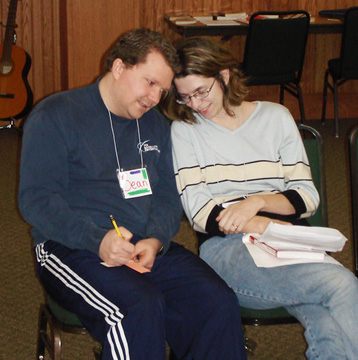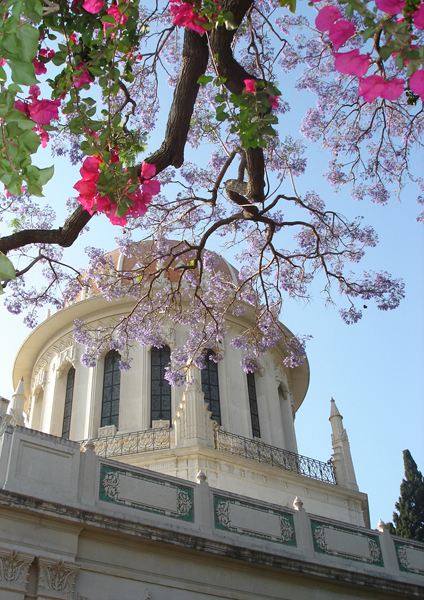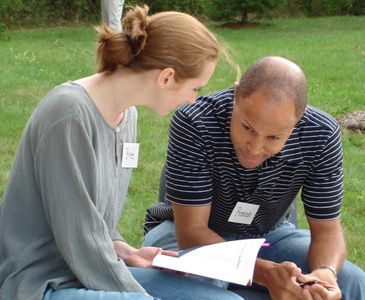
Encouraging Strong Marriages
Guidance from the Bahá’í Writings:
"If love and agreement are manifest in a single family, that family will advance, become illumined and spiritual…." (‘Abdu’l-Bahá, Promulgation of Universal Peace, pp. 144-145)
"...[T]he family, being a human unit, must be educated according to the rules of sanctity. All the virtues must be taught the family. The integrity of the family bond must be constantly considered…. The injury of one shall be considered the injury of all; the comfort of each, the comfort of all; the honor of one, the honor of all." (‘Abdu’l-Bahá: Promulgation of Universal Peace, p. 168)
"When you love a member of your family..., let it be with a ray of the Infinite Love! Let it be in God, and for God! Wherever you find the attributes of God love that person...." (‘Abdu’l-Bahá, Paris Talks, p. 38)
"Note ye how easily, where unity existeth in a given family, the affairs of that family are conducted; what progress the members of that family make, how they prosper in the world. Their concerns are in order, they enjoy comfort and tranquility, they are secure, their position is assured, they come to be envied by all. Such a family but addeth to its stature and its lasting honor, as day succeedeth day." (‘Abdu’l-Bahá, Selections from the Writings of ‘Abdu’l-Bahá, p. 279)
"Local Spiritual Assemblies, which are embryonic Local Houses of Justice, should develop as rallying centers of the community. They must concern themselves not only with teaching the Faith, with the development of the Bahá’í way of life and with the proper organization of the Bahá’í activities of their communities, but also with those crucial events which profoundly affect the life of all human beings: birth, marriage, and death." (Universal House of Justice, Messages 1963-1986, #280.20)
"The Spiritual Assembly should always be concerned that the believers in its community are being deepened in their understanding of the Bahá’í concept of marriage, especially the young people, so that the very thought of divorce will be abhorrent to them." (On behalf of the Universal House of Justice, Lights of Guidance, no. 1304)
“…[I]f the friends are not able to maintain harmony within their families, on what other basis do they hope to demonstrate to a skeptical world the efficacy of the pre-eminent character of the Revelation of Bahá’u’lláh? What possible influence could they hope to exert on the development of nations and the establishment of world peace?” (On behalf of the Universal House of Justice, Lights of Guidance, p. 222)
Some Perspectives from Marriage Transformation:
One of many Spiritual Assembly responsibilities is arranging for their community to meet for 19-Day Feasts, a gathering that occurs every 19 days. Feasts include a spiritual, administrative, and a social portion and are designed to promote community unity. As part of the spiritual portion, there are prayers and readings from the Writings of the Bahá’í Faith. There is also often music. An Assembly or the host of a Feast could choose to have the theme of the readings be about marriage as one way of encouraging couples to form and sustain strong marital unions. Below is a link to a pdf download of a selection of readings and prayers that could be used for the spiritual portion of a 19-Day Feast and a link to a compilation on marriage to use as a source.
From the Bahá’í Writings: Feast Readings and Prayers on the Topic of Marriage
To Set the World in Order: Building and Preserving Strong Marriages (Research Department of the Universal House of Justice, August 2023)
Other suggestions for integrating marriage education into community life can be found in the following pdf file:
Marriage Transformation has created a vision and action document to assist individuals, Assemblies, and communities with ideas for how to include education as part of the rhythm of community life: Relationship, Marriage, Parenting, and Family Education in the Bahá’í Faith Community, Potential Ideas and Actions to Consider from Marriage Transformation®, Version: July 15, 2025 (pdf)
Building Relationships Between Individuals, Couples, and the Assembly
Guidance from the Bahá’í Writings:
“[Assemblies] must endeavor to promote amity and concord amongst the friends, efface every lingering trace of distrust, coolness and estrangement from every heart, and secure in its stead an active and whole-hearted cooperation for the service of the Cause. … They must promote by every means in their power the material as well as the spiritual enlightenment of youth, the means for the education of children, institute, whenever possible, Bahá’í educational institutions, organize and supervise their work and provide the best means for their progress and development.” (Shoghi Effendi, Compilation of Compilations, Vol. II, “The Local Spiritual Assembly”, p. 48)


Bahá’í Wedding/Marriage Ceremonies
Guidance from the Bahá’í Writings:
"The obligation of the Spiritual Assembly is to ascertain that all the requirements of civil and Bahá’í law have been complied with, and, having done so, the Assembly may neither refuse to perform the marriage ceremony nor delay it." (Universal House of Justice, March 30, 1967, to a National Spiritual Assembly, Lights of Guidance, no. 1231)
Individual Transformation and Relationship to the Laws (downloable pdf); provided on behalf of the Universal House of Justice to an individual 9-24-14
Some Perspectives from Marriage Transformation: The requirements generally include obtaining parental consent, having two approved witnesses, and holding a Bahá’í ceremony that includes the Bahá’í marriage vow (see Relationships and Weddings for more details). The wedding is spiritually blessed and starts on a strong foundation of unity when it is in alignment with the guidance in the Bahá’í Writings. There are consequences for not following this important law, which an Assembly could share with an individual or a couple considering such an action.

Help for Individuals and Couples
Guidance from the Bahá’í Writings:
"The House of Justice advises you to continue the strenuous efforts you are making to overcome the
difficulties in your marriage. It is pleased to note that you and your husband have turned to the Local Spiritual Assembly for guidance and have sought help from a Bahá'í who is a marriage counsellor. Such endeavors, when combined with a strong and determined effort, improve greatly the prospects that your marriage can be maintained. However, it must also be borne in mind that the fact that Bahá'u'lláh has permitted divorce is, no doubt, an indication that in certain circumstances it is unavoidable. If your earnest efforts to maintain your marriage do not yield the desired result, you should not be distraught." (On behalf of the Universal House of Justice, April 28, 1989, to an individual believer, The Compilation of Compilations, Vol. II, no. 2345)
“Consultation is…available for the individual in solving his own problems; he may consult with his Assembly, with his family and with his friends.” (On behalf of the Universal House of Justice quoted in the “Understanding Tests” letter from the Research Department to the Universal House of Justice, July 17, 1989)
“Neither you nor your husband should hesitate to continue consulting professional marriage counselors, individually and together if possible, and also to take advantage of the supportive counseling which can come from wise and mature friends. Non-Bahá’í counseling can be useful but it is usually necessary to temper it with Bahá’í insight.” (On behalf of the Universal House of Justice: The Compilation of Compilations, Vol. II, “Preserving Bahá’í Marriages”,
p. 455)
See Resources for additional helpful materials.

When Individuals and Couples Need Assembly Help
Some Perspectives from Marriage Transformation:
Local Spiritual Assemblies feel and express frustration when individuals and couples delay
seeking help for months or years. Seeing an Assembly, and seeking counseling help, when an issue is in its early stages can provide the opportunity for the Assembly to be of service. Problems can then be addressed before they become destructively entrenched.
In addition, when an individual or a couple approaches an Assembly, they sometimes present final decisions rather than requesting guidance before decisions are made. This could include telling an Assembly that you are going to get married in a week rather than involving them early so you are fully informed of any Bahá’í principles that apply to wedding planning. Alternatively, it could be telling the Assembly that you are divorcing instead of asking for help with issues or reconciliation. Consultation achieves its best outcomes when all parties are open to addressing issues promptly and searching for new perspectives, information, and conclusions.
Times when it may be wise to approach an Assembly for information and guidance are:
-
When you wish to date or court someone and are unfamiliar with the Bahá’í teachings on the subject
-
When you have decided to marry but you have not yet asked for parental consent or begun wedding planning and are unfamiliar with the Bahá’í teachings on the subject
-
When you have received parental consent to marry and have potential wedding witnesses for the Assembly to review
-
When you need to understand how to consult as a married couple
-
When your marriage begins experiencing noticeable challenges or more serious issues are occurring, such as domestic violence
-
When you want information about being an excellent parent
-
When you are considering the possibility of marital separation
-
When you need help with reconciliation
-
When you are seriously considering divorce
-
Whenever you are unclear about Bahá’í principles or laws that apply to your life
|
Depending on the circumstances, a whole Assembly may meet with someone or a couple, a committee or representative may meet with them instead, or the secretary may simply provide helpful resources and referrals. If there is not a Local Spiritual Assembly available to you, then a National Spiritual Assembly may be of assistance.

Online Learning courses, including ones for Spiritual Assemblies and Challenged Marriages: Susanne M. Alexander serves as the owner and course creator of Transformation Learning Center for online relationship, marriage, parenting, and family courses that are practical and Baha'i-Faith-based. People of all faiths are welcome. There is an excellent facilitator team and coaching available. Please come join us today! Information is available at this link:https://www.transformationlearningcenter.com/, and specific courses for Spiritual Assemblies are here:
https://www.transformationlearningcenter.com/collections/community
Conducting Initial Meetings with Individuals and Couples with Marriage Problems - A Resource foLocal Spiritual Assemblies Provided by Marriage Transformation® - Version: September 19, 2025; An Effort to Apply the Bahá’í Teachings to the Strengthening of Marriage; Note: This document is an individual initiative and is not sponsored by Bahá’í Institutions.
Need to Refer People to Professional Help from Practioners Who Are Bahá’ís?
Please see Marriage Transformation Resources http://bahaimarriage.net/resources.htm




